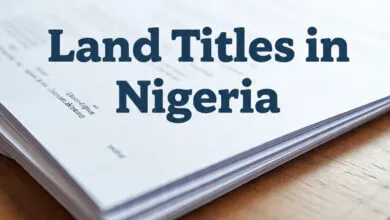Land Banking in Nigeria: Frequently Asked Questions You Should Know

Introduction:
Land banking in Nigeria has become one of the smartest real estate strategies for long-term investors. As cities expand and rural areas gradually develop, buying land early and holding it until prices rise has proven to be both profitable and secure. However, many people still have questions about how land banking works, what to watch out for, and how to get started. This article answers 15 of the most frequently asked questions to help you make informed decisions.
1. What is land banking?
Land banking is the strategic purchase of undeveloped or underdeveloped land, to hold onto it until its value appreciates. Investors often buy in areas projected for future growth, such as new highways, industries, or residential estates.
2. Is land banking legal in Nigeria?
Yes, land banking is legal in Nigeria. However, to avoid legal issues, it’s important to buy land with verified titles and documents, and preferably through reputable real estate companies or agents.
3. How do I make money from land banking?
You earn by selling the land when its value increases. For example, land bought for N500,000 in an undeveloped area may appreciate to N5 million and even more in a few years due to urban expansion or infrastructure projects. The earlier you buy, the greater the returns.
Additionally, you can lease the land for temporary uses such as agriculture, warehouse storage, event grounds, or other short-term investments. This generates passive income while you wait for the land value to rise.
4. What type of land is best for land banking?
Target land in fast-developing or government-planned areas. Look for places near proposed airports, industrial hubs, or housing schemes. These areas have high potential for value appreciation.
5. How long should I hold the land before selling?
Most land banking investments are medium to long-term. Generally, you might hold the land for 5 to 10 years, depending on how fast development reaches the area.
6. Is land banking risky?
Every investment has risks. In land banking, risks include buying from fraudsters, unclear land titles, or choosing areas that never develop. Proper due diligence and working with trusted professionals can reduce these risks.
7. Can I start land banking with little money?
Absolutely. Some properties in emerging areas are available at low prices or installment payment plans. You don’t need millions to begin; just start small and scale up over time.
8. What documents proofs that I own the land?
You should get the survey plan, deed of assignment, receipt of payment, and either a Certificate of Occupancy or proof of excision. These documents prove ownership and legality.
9. What signs show a land will appreciate in value?
Look for indicators such as government road projects, increased housing demand, and nearby developments like schools, factories, and shopping centers.
10. Should I buy land through a company or go solo?
If you’re new to land banking, it’s safer to buy through registered real estate companies. They often handle due diligence, documentation, and offer installment plans. However, experienced investors may choose to go solo with caution.
11. Can I use land as collateral for loans?
Yes, but only if the land has a valid and recognized title. Banks typically accept land with a Certificate of Occupancy or Governor’s Consent.
12. What are the benefits of land banking?
Benefits include long-term value appreciation, passive income potential, a hedge against inflation, and low maintenance costs. Unlike buildings, land doesn’t depreciate.
13. Can I develop the land before selling it?
Yes. Some investors fence the land, plant trees, or build small structures to increase perceived value and discourage encroachment. Development can raise your resale price significantly.
14. Can I resell my land at any time?
Yes, you can resell your land whenever you want, provided it has valid documents and no encumbrances. However, for better profit, it’s often wise to wait until the land has appreciated significantly or there’s increased demand in that location. You can also increase your resale value by fencing or partially developing the land.
15. What are the best cities for land banking in Nigeria?
Top choices include Lagos (Epe, Ibeju-Lekk, Ikorodu), Abuja (Jahi, Kuje, Guzape), Port Harcourt, and Ogun State (Mowe, Ibafo, Kobape). These locations are growing quickly and attracting infrastructure projects. You might want to check for fast developing areas with projected future growth in any other location you might be interested in.
Conclusion
Land banking in Nigeria is a powerful wealth-building strategy when done right. So, if you’re still wondering whether land banking is worth it, remember this timeless advice:
“Don’t wait to buy land. Buy land and wait.” The earlier you start, the greater your chances of building lasting wealth.
With the right knowledge, location, and legal backing, your land today could become your fortune tomorrow. Do your research, start small if needed, and think long-term. If you’re ready to begin, consult a trusted real estate professional and take that first step.




